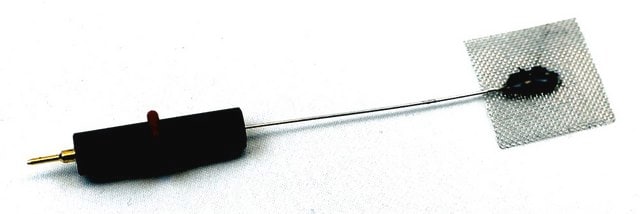267201
Platinum
wire, diam. 0.5 mm, 99.99% trace metals basis
Synonym(s):
Platinum element, Platinum gray
Sign Into View Organizational & Contract Pricing
All Photos(1)
About This Item
Empirical Formula (Hill Notation):
Pt
CAS Number:
Molecular Weight:
195.08
EC Number:
MDL number:
UNSPSC Code:
12141734
PubChem Substance ID:
NACRES:
NA.23
Recommended Products
Quality Level
Assay
99.99% trace metals basis
form
annealed
wire
resistivity
10.6 μΩ-cm, 20°C
diam.
0.5 mm
bp
3827 °C (lit.)
mp
1772 °C (lit.)
density
21.45 g/cm3 (lit.)
SMILES string
[Pt]
InChI
1S/Pt
InChI key
BASFCYQUMIYNBI-UHFFFAOYSA-N
Related Categories
General description
Platinum (Pt) is a highly ductile, malleable and unreactive metal. It is resistant to corrosion and stable at high temperatures. Although resistant to hydrochloric and nitric acid, it dissolves readily in hot aqua regia to form chloroplatinic acid.
Application
Pt wire may be used :
- as a microelectrode-indicator electrode in voltammetry
- as a transvascular embolic agent
- to study chronopotentiometry of hydrogen peroxide with a platinum wire electrode or
- in gas detection instruments.
Quantity
400 mg = 10 cm; 2 g = 50 cm
Storage Class Code
13 - Non Combustible Solids
WGK
nwg
Flash Point(F)
Not applicable
Flash Point(C)
Not applicable
Choose from one of the most recent versions:
Already Own This Product?
Find documentation for the products that you have recently purchased in the Document Library.
Customers Also Viewed
Voltammetry with Stationary Microelectrodes of Platinum Wire.
Laitinen HA and Kolthoff IM
The Journal of Physical Chemistry, 45(7), 1061-1079 (1941)
Hiroaki Akamatsu et al.
Japanese journal of clinical oncology, 43(6), 664-668 (2013-04-16)
Interstitial lung disease associated with gefitinib is a critical adverse reaction. When geftinib was administered to EGFR-unknown patients, the interstitial lung disease incidence rate was approximately 3-4% in Japan, and usually occurs during the first 4 weeks of treatment. However
Yao-Hsuan Tseng et al.
Biochimica et biophysica acta, 1830(6), 3787-3795 (2013-04-02)
Traditional antibacterial photocatalysts are primarily induced by ultraviolet light to elicit antibacterial reactive oxygen species. New generation visible-light responsive photocatalysts were discovered, offering greater opportunity to use photocatalysts as disinfectants in our living environment. Recently, we found that visible-light responsive
Catalysis: The accelerator.
Mark Peplow
Nature, 495(7440), S10-S11 (2013-03-15)
Liang Li et al.
Water science and technology : a journal of the International Association on Water Pollution Research, 67(11), 2451-2457 (2013-06-12)
This study investigated the mechanism and kinetic modeling of electrolytic degradation of ammonia with Pt/Ti anode. The results show that ammonia oxidation from direct oxidation or indirect oxidation with hydroxyl radicals was slow but can be observed under pH 9
Our team of scientists has experience in all areas of research including Life Science, Material Science, Chemical Synthesis, Chromatography, Analytical and many others.
Contact Technical Service



